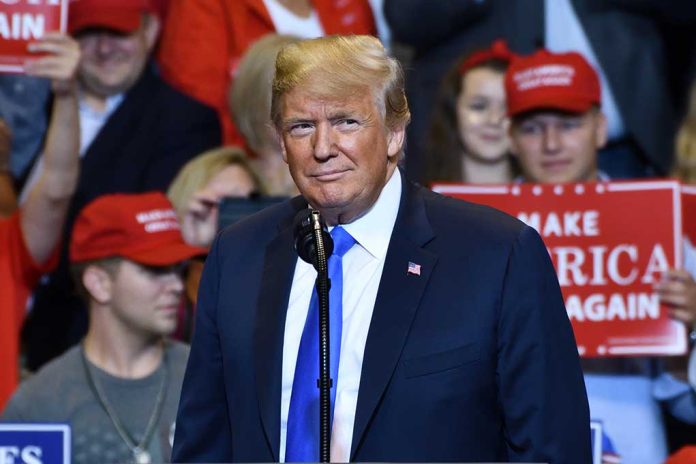
President Trump bolsters America’s religious freedoms by appointing prominent Catholic bishops and leaders to the newly formed Religious Liberty Commission’s advisory boards as part of his commitment to protecting faith-based values against growing secular threats.
Key Takeaways
- President Trump has appointed three U.S. Catholic bishops and a parish priest to the advisory board of the Religious Liberty Commission
- The Commission will include multiple advisory boards with religious leaders, legal experts, and lay advisers to provide comprehensive guidance
- Archbishop Cordileone, Bishop Paprocki, Bishop Rhoades, and Father Ferguson bring extensive experience in religious liberty advocacy
- The Commission aims to produce a detailed report addressing foundations of religious liberty, current threats, and protection strategies
- This initiative reflects Trump’s broader commitment to positioning religion as a core component of American public life
Presidential Appointments to Strengthen Religious Freedom
President Donald Trump has taken significant steps to reinforce religious liberty in America by appointing three U.S. Catholic bishops and a parish priest to serve on an advisory board for the Religious Liberty Commission. The appointees include Archbishop Salvatore J. Cordileone of San Francisco, Bishop Thomas J. Paprocki of Springfield, Illinois, Bishop Kevin C. Rhoades of Fort Wayne-South Bend, Indiana, and Father Thomas Ferguson, a parish priest from the Diocese of Arlington, Virginia. Each of these religious leaders brings substantial experience and dedication to the protection of religious freedoms, positioning the commission to address contemporary challenges faced by faith communities across the nation.
These appointments are part of Trump’s broader strategy to ensure that religious liberty remains protected against increasing secular pressures. The Commission’s Advisory Board of Religious Leaders includes 13 members in total, featuring other prominent Catholic figures like Cardinal Timothy M. Dolan of New York and Bishop Robert E. Barron of Winona-Rochester, Minnesota. By assembling this diverse group of religious authorities, the president demonstrates his commitment to incorporating various faith perspectives in developing policies that safeguard the constitutional right to religious freedom for all Americans.
Experienced Religious Leaders at the Helm
The Catholic bishops appointed to the advisory board bring valuable expertise in religious liberty advocacy. Bishop Rhoades currently serves as chairman of the U.S. Conference of Catholic Bishops’ Committee on Religious Liberty and has extensive experience on other committees, including Doctrine and Ecumenical and Interreligious Affairs. His leadership background makes him particularly qualified to advise on matters concerning the intersection of faith and public policy. Bishop Paprocki, who chairs the USCCB’s Committee on Canonical Affairs and Church Governance, was instrumental in launching the “Fortnight for Freedom” campaign, which raised awareness about threats to religious liberty.
Archbishop Cordileone has been actively involved with the USCCB’s Committee on Laity, Marriage, Family Life, and Youth, bringing important perspectives on how religious liberty affects family values and community life. Father Ferguson, the parish priest appointee, contributes scholarly insight having authored a book on John Courtney Murray, a significant theologian and thinker on religious liberty in America. These leaders collectively represent a wealth of theological understanding and practical experience that will guide the commission’s work in addressing contemporary religious freedom challenges.
Comprehensive Approach with Multiple Advisory Boards
President Trump’s administration has demonstrated a thorough approach to religious liberty by establishing multiple advisory boards for the commission. In addition to the religious leaders’ board, the president has appointed six legal advisers, including constitutional law experts and religious freedom advocates. These legal minds will provide crucial insights into the constitutional foundations of religious liberty and potential legislative or judicial remedies for current threats. The commission will also benefit from nine lay leader advisers who bring perspectives from various faith communities and civic organizations.
This multifaceted structure reflects the administration’s recognition that protecting religious freedom requires diverse expertise. The commission is tasked with producing a comprehensive report that will examine the foundational principles of religious liberty, analyze current and emerging threats to faith communities, and recommend effective strategies for protecting these fundamental freedoms. Specific concerns to be addressed include challenges to faith-based immigration services, rising antisemitic incidents, and parents’ rights to make faith-based educational choices for their children—issues highlighted in the U.S. bishops’ 2025 report.
Reinforcing America’s Religious Foundation
The establishment of the Religious Liberty Commission and its advisory boards represents President Trump’s unwavering commitment to preserving America’s religious heritage. By bringing together religious leaders, legal experts, and civic voices, the administration aims to create policies that prevent discrimination against people of faith and reinforce individuals’ right to practice their religion without government interference. This initiative stands in stark contrast to progressive policies that have increasingly marginalized religious perspectives in public life and subjected faith-based organizations to regulatory burdens that threaten their mission.
As these advisory boards begin their work with the commission, they face a cultural landscape where religious liberty is increasingly under pressure from secular ideologies and government overreach. Their recommendations will likely influence how government agencies interact with religious organizations and how courts interpret religious freedom protections. For conservative Americans who value faith as a cornerstone of national identity, the Religious Liberty Commission represents a crucial bulwark against the erosion of traditional values and a positive step toward ensuring that religion remains a protected and respected element of American public life.



